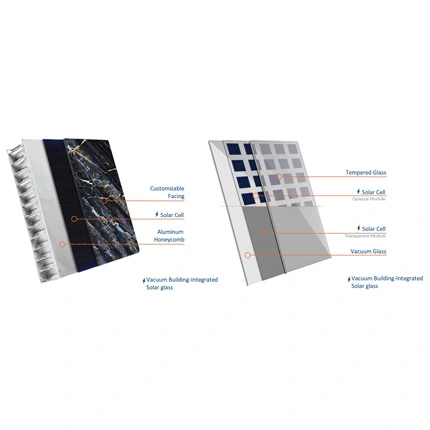
Vacuum BIPV glass, also known as vacuum insulated building-integrated photovoltaics glass, is a relatively new and advanced building material that combines several innovative technologies. Vacuum BIPV glass is a developing technology, and ongoing research aims to improve its efficiency, affordability, and large-scale production methods.
Now green building is a common view in the architecture world and all of the designers and architecture all give their full strength to make the new building low carbon and produce energy itself. Under this conception, Evergreen vacuum glass supplier give develop the new products of GreenVac BIPV. With the vacuum glass part, it can gain the most sunlight to the room and keep a very low standard of heat in; also by the help of the BIPV outer panels, it can produce the energy no matter daytime and night. We think this should be the real green building material.
Maximum size | 1500 x 3600 mm |
U-Value | 0.47 W/(m².K) |
Acoustic performance | 39-42 =45(-2;-4) Rw (C; Ctr)(dB) |
LT – Light transmission | 85% or above |
BIPV efficiency of >24%; | |
Warranty more than 30 years | |
1. Commercial Building Facades
Vacuum BIPV Glass can be used in the facades of commercial buildings, where it serves multiple functions: as an architectural feature, a source of natural light, a thermal insulator, and a generator of electricity. This application can significantly reduce the building’s reliance on external energy sources for heating, cooling, and lighting.
2. Residential Windows and Skylights
In residential buildings, BIPV double vacuum glass can replace traditional windows and skylights. It offers the dual benefits of minimizing heat loss (or gain) and generating electricity to power home appliances, lighting, and heating/cooling systems, thereby reducing utility bills and increasing energy independence.
3. Greenhouses
Vacuum BIPV Glass is ideal for greenhouse applications where temperature control and light are critical for plant growth. It can help maintain optimal thermal conditions inside the greenhouse while generating electricity to power supplemental lighting, irrigation systems, or climate control equipment.
4. Educational and Institutional Buildings
Schools, universities, and other institutional buildings with large roof areas or extensive glazing can benefit from Vacuum BIPV Glass by integrating it into roofs, atriums, and curtain walls. This not only provides an educational demonstration of renewable energy but also helps these institutions lower their operational costs and carbon footprint.
5. Transportation Hubs
Airports, train stations, and bus terminals, which often have large glazed areas and high energy demands, can incorporate Vacuum BIPV Glass into their design. This application can significantly contribute to the energy needs of these facilities, including lighting, information displays, and climate control systems, while showcasing sustainable technology to the public.
Energy Generation: Vacuum BIPV glass incorporates photovoltaic cells or thin-film solar panels into its structure, allowing it to generate electricity from sunlight. This enables buildings to harness renewable energy while providing other functionalities, such as thermal insulation and transparency.
High Efficiency: Vacuum BIPV glass utilizes advanced solar cell technology to achieve high levels of energy conversion efficiency, maximizing the amount of electricity generated from sunlight.
Aesthetics: Vacuum BIPV glass offers architectural flexibility and aesthetic appeal, allowing for the integration of solar energy generation into building facades, windows, skylights, and other structural elements without compromising design aesthetics.
Environmental Benefits: Vacuum BIPV glass contributes to environmental sustainability by reducing reliance on fossil fuels and lowering carbon emissions associated with electricity generation. It helps buildings achieve green building certifications and energy efficiency goals.
Smart Building Integration: Vacuum BIPV glass can be integrated into smart building systems to optimize energy usage, monitor performance, and adjust building operations based on real-time data and environmental conditions.
Pls contact us if you have any inquire or questions, thank you.
No.12111, JINGSHI ROAD, LIXIA DIST, JINAN CITY, SHANDONG PROVINCE, CHINA